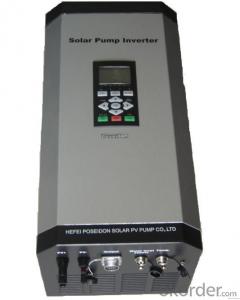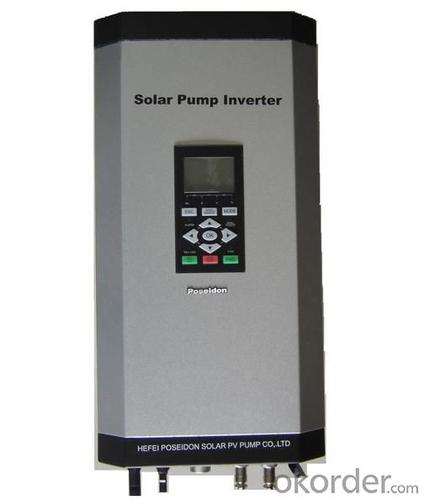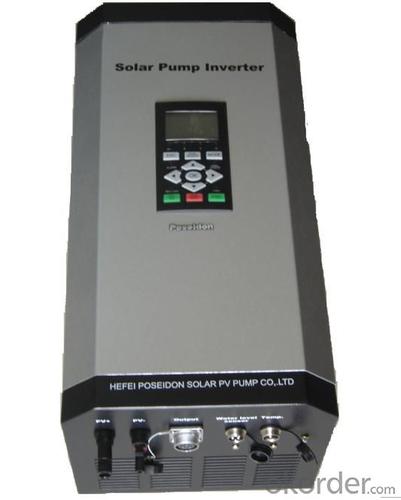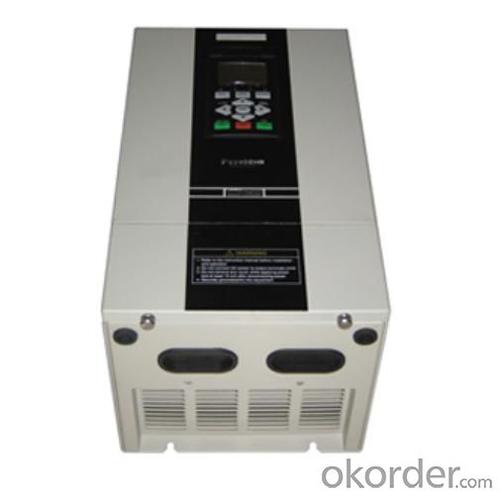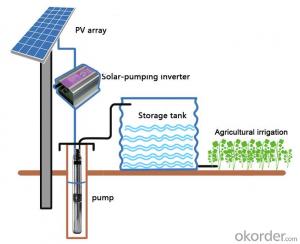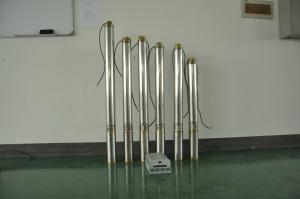Solar Pump With Backup Battery FCPM7K5H
- Loading Port:
- China Main Port
- Payment Terms:
- TT OR LC
- Min Order Qty:
- -
- Supply Capability:
- -
OKorder Service Pledge
Quality Product, Order Online Tracking, Timely Delivery
OKorder Financial Service
Credit Rating, Credit Services, Credit Purchasing
You Might Also Like
Solar pump inverter FCPM7K5H Product Description:
Product Description:
Solar water pumping system is constructed with solar panel array,solar pump inverter and AC water pump, DC current produced from solar panel will be delivered to solar pump inverter,and it will convert it into AC current to drive water pump,and will automatically regulate output frequency according to sun radiance intensity,maximally realize MPPT tracking function.
Product Features
Adopting the proposed dynamic VI maximum power point tracking (MPPT) control method, with fast response, and reliable operation, achieves efficiency of 99%.
Designed with variable frequency driver, greatly improves efficiency
Extremely high efficiency
Digital mode control, with automatic operation and manual operation mode options
Complete protection functions
Adopts intelligent IPM module, with high reliability
LCD display and operation panel, in real time presents operating data
Optional for water level measurement and control circuit
Applicable for general ACC pumps, like centrifugal pump, piston pump etc.
Independent intellectual property; Highly effective, the redundant reliability, exempts the maintenance and the long life.
The pumps are soft started, fully protected.
No batteries are used. So better Sunlight, more water
Datasheet.
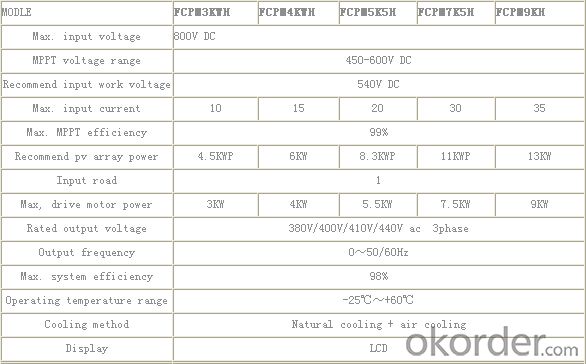
- Q: How does the distance between the solar panels affect the performance of a solar pump?
- The distance between solar panels can affect the performance of a solar pump in a few ways. Firstly, if the panels are too far apart, it can lead to voltage drop and decreased efficiency as the electricity has to travel a longer distance. Secondly, a larger distance can result in increased resistance in the wiring, leading to energy losses and reduced pump performance. Additionally, the angle and orientation of the panels can also be affected by the distance between them, impacting the amount of sunlight they receive and therefore affecting the overall efficiency of the solar pump system.
- Q: Can a solar pump be used for water supply in remote research stations?
- Yes, a solar pump can be used for water supply in remote research stations. Solar pumps are a sustainable and reliable solution for accessing water in remote areas where grid electricity may not be available. They use solar energy to power the pump, eliminating the need for fuel or electricity, making them environmentally friendly and cost-effective. Additionally, solar pumps can be easily installed and maintained, making them a suitable option for water supply in remote research stations.
- Q: Are solar pumps suitable for use in desert areas?
- Yes, solar pumps are suitable for use in desert areas. Solar pumps are powered by sunlight, which is abundant in desert regions. They are highly efficient and can provide a sustainable solution for water pumping needs in such arid environments. Additionally, solar pumps are low maintenance, cost-effective, and environmentally friendly, making them a suitable choice for desert areas where traditional power sources may be limited or unreliable.
- Q: What is the payback period for installing a solar pump?
- The payback period for installing a solar pump can vary depending on factors such as the cost of installation, the amount of energy saved, and the local electricity rates. However, on average, the payback period for a solar pump installation ranges from 2 to 6 years.
- Q: How does the efficiency of a solar pump compare to a diesel pump?
- The efficiency of a solar pump is generally higher than that of a diesel pump. Solar pumps utilize direct sunlight to generate electricity, which is then used to power the pump. This process is highly efficient as it directly converts solar energy into mechanical energy, resulting in minimal energy losses. On the other hand, diesel pumps rely on the combustion of diesel fuel to generate power, which is inherently less efficient due to energy losses in the fuel combustion process. Additionally, solar pumps do not require ongoing fuel costs and have lower maintenance needs compared to diesel pumps, making them a more cost-effective and environmentally friendly option in the long run.
- Q: Can a solar pump be used for water supply in military bases or camps?
- Yes, a solar pump can be used for water supply in military bases or camps. Solar pumps are a reliable and efficient solution as they harness solar energy to power the pump, eliminating the need for traditional electricity sources. This makes them ideal for remote locations where access to electricity might be limited. Solar pumps can provide a sustainable and cost-effective water supply, supporting the water needs of military personnel in bases or camps.
- Q: Can a solar pump be used for water supply in coffee plantations?
- Yes, a solar pump can be used for water supply in coffee plantations. Solar pumps are efficient and environmentally friendly alternatives to traditional pumps, as they utilize solar energy to power the pump and provide water for irrigation. This makes them well-suited for remote locations such as coffee plantations, where access to electricity may be limited. Additionally, solar pumps help reduce operating costs and dependency on fossil fuels, making them a sustainable solution for water supply in coffee plantations.
- Q: Can a solar pump be used in areas with high levels of fluoride in the water?
- Yes, a solar pump can be used in areas with high levels of fluoride in the water. Solar pumps are primarily used to pump water from a source such as a well or a borehole, and they do not directly affect the chemical composition of the water. However, it is important to note that a solar pump does not treat or remove fluoride from the water. To ensure safe drinking water, an appropriate water treatment system may be required to reduce fluoride levels before consumption.
- Q: Can a solar pump be used in areas with extreme weather conditions?
- Yes, a solar pump can be used in areas with extreme weather conditions. Solar pumps are designed to withstand various weather conditions, including extreme heat, cold, and precipitation. They are built with durable materials and are sealed to protect them from moisture and dust. Additionally, solar pumps are equipped with temperature and overvoltage protection systems to ensure their safe operation in extreme weather conditions. However, it is important to choose a solar pump specifically designed for the intended weather conditions to ensure optimal performance and longevity.
- Q: Can a solar pump be used for water supply in remote villages or communities?
- Yes, a solar pump can be used for water supply in remote villages or communities. Solar pumps are a sustainable and cost-effective solution that utilizes solar energy to pump water from underground sources such as wells or boreholes. They can provide a reliable and continuous water supply, even in areas with limited or no access to grid electricity. Being independent of fuel or electricity, solar pumps are ideal for remote locations where traditional water pumping methods may not be feasible or affordable.
Send your message to us
Solar Pump With Backup Battery FCPM7K5H
- Loading Port:
- China Main Port
- Payment Terms:
- TT OR LC
- Min Order Qty:
- -
- Supply Capability:
- -
OKorder Service Pledge
Quality Product, Order Online Tracking, Timely Delivery
OKorder Financial Service
Credit Rating, Credit Services, Credit Purchasing
Similar products
Hot products
Hot Searches
Related keywords

